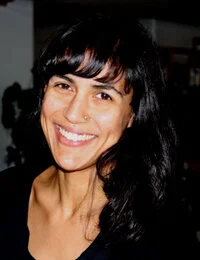21st Century Mind Reading Session
Session Summary:
For many existing models of predicting mental health status, ‘ground truth’ relies on self-reported scales or self-reported diagnosis. In reality, ‘ground truth’ relies on expertise and collaboration from participants. This session will discuss topics related to human-centred mental health technology, prediction models of mental health status, emotion detection, annotation labelling, natural language processing of social media data and electronic health records. The goal of this session is to critically reflect on the concept of ‘ground truth’ and the use of objective and subjective data along with the limitations of where we are in this space in order to challenge our current thinking so that we can establish more ‘joined-up’ workable solutions moving forward.
have your SAY:
Please submit your questions and comments that you would like to be included in this session’s Google Doc.
Chair & Panellists:
CHAIR: maria liakata
Maria is a Turing AI fellow and Professor in Natural Language Processing (NLP) at the School of Electronic Engineering and Computer Science, Queen Mary University of London and the Department of Computer Science, University of Warwick. At the Turing she founded and co-leads the NLP and data science for mental health interest groups and supervises PhD students. She is in receipt of one of the five Turing AI fellowships, on Creating time sensitive sensors from user-generated language and heterogeneous content. She is the PI of projects on “Emotion sensing using heterogeneous mobile phone data”, “Language sensing for dementia monitoring & diagnosis” and “Opinion summarisation from social media”.
Lucia Lushi Chen
I’m a Ph.D. student at Edinburgh University, School of Informatics. My research involves using digital data to track the affective, cognitive, and behavioral changes of users, identifying the associations between digital signals and symptoms of mental disorders. I am interested in early symptom detection as a human-centered approach to assist interventions and early prevention of mental disorders or harmful behaviors. Along the way, I deeply care about ethical research practices, model bias and fairness. My work also involves understanding model biases and examining the ‘noise’ in social media signals. I am writing up my Ph.D. thesis at the moment and looking for a post-doctoral research position.
Nina Di Cara
Nina is a PhD student at the University of Bristol MRC Integrative Epidemiology Unit who is interested in the application of data science to social issues. Her PhD considers mental health inference from social media, particularly working on establishing high quality ground truth data sources from longitudinal cohort studies. Her research is a mixture of applied data science and qualitative work on the ethics of data linkage. Before starting a PhD Nina spent several years in children's safeguarding working with parents and children who lived with the impacts of mental ill health.
Suzi Godson
Suzi Godson, MPsych, is a research psychologist (PhD candidate), author and expert in the field of sex and relationships. Suzi is co-founder of MeeTwo Education whose multi-award winning app, MeeTwo, provides young people with safe immediate mental help. Suzi’s internationally syndicated sex and relationships column in The Times newspaper has been running for sixeen years. Prior to retraining as a psychologist, she was an award-winning graphic designer. Suzi was named Rising Star in the Europe-wide Technology Playmaker awards 2018.
Sumithra Velupillai
Sumithra Velupillai, Ph.D., is a Lecturer in Applied Health Informatics, at the NIHR South London and Maudsley Biomedical Research Centre (SLaM BRC), Institute of Psychiatry, Psychology and Neuroscience, King's College London, UK. She has a background in clinical Natural Language Processing (NLP), and previous to her current post, she has worked at the Department of Computer and Systems Sciences, Stockholm University, on information extraction from Swedish clinical text, as a postdoc in the US (UCSD and University of Utah), and at KTH/King's College London on a 3-year Marie Sklodowska Curie Actions/Swedish Research Council international career grant fellowship. Her main area of expertise is in developing and applying NLP approaches for clinical use-cases.
Bo Wang
Bo Wang currently works at Department of Psychiatry, University of Oxford and the Alan Turing Institute (ATI), with research interest in modelling neuropsychiatric disorder from multi-modal data including language and speech and more broadly, applying machine learning in mental health. He is also a fellow at GGV Capital and holds a PhD in Natural Language Processing (NLP).





